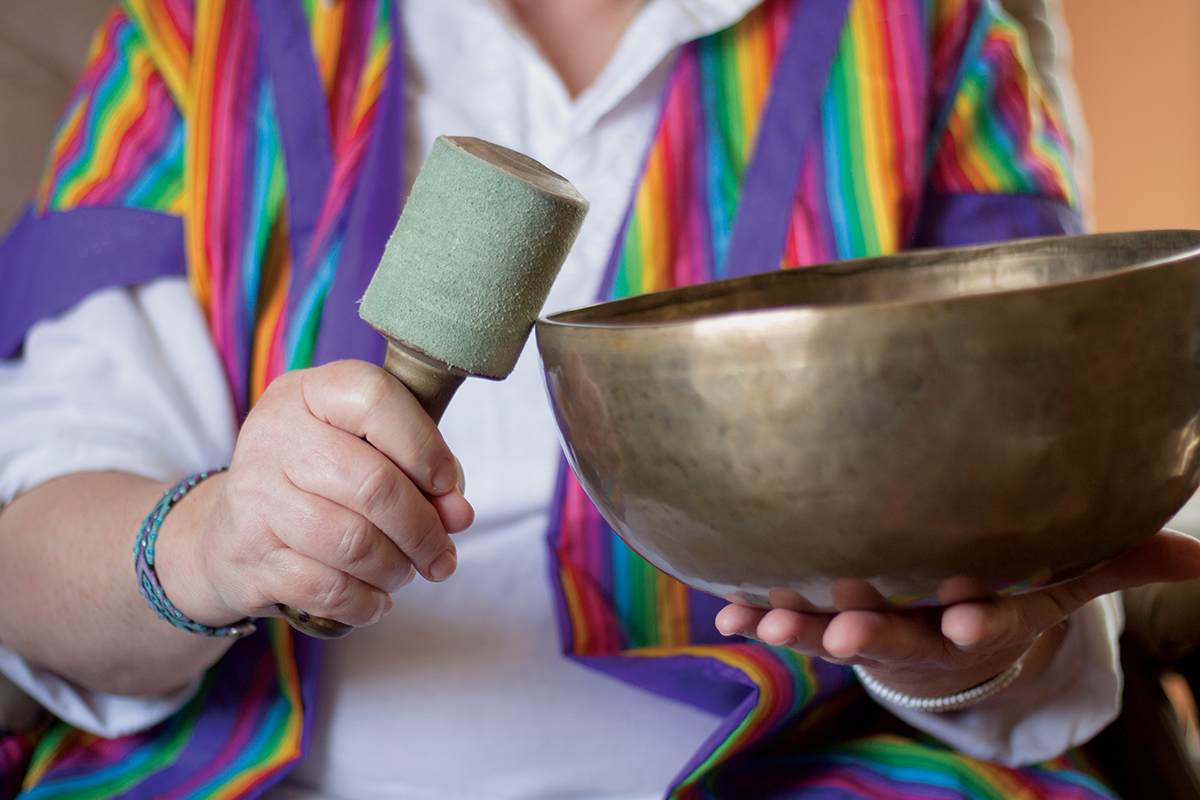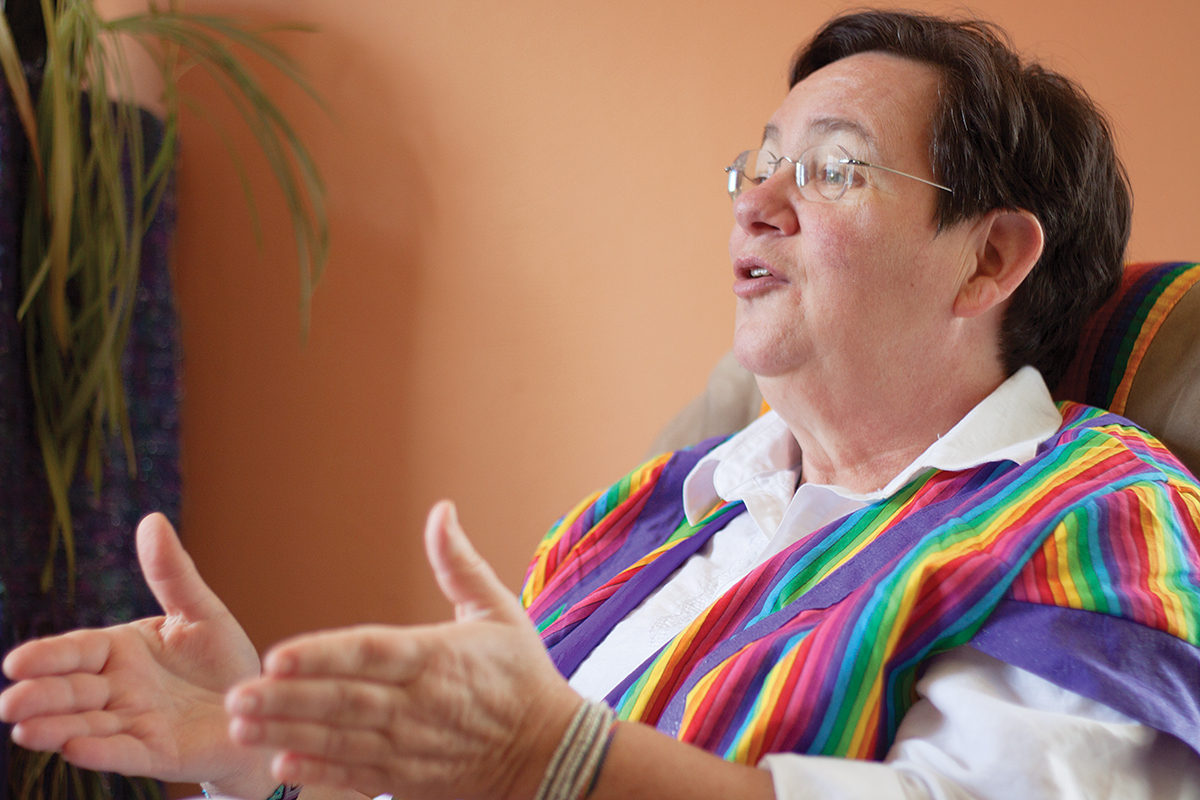Story by Jamie Hershman
Photos by Andy Abeyta
Barb Ryan’s favorite piece of advice to give students is to smile. “Smiling is a random act of kindness,” she says, grinning at a student walking up the steps to her home’s front door.
Students shuffle into the tranquil space of Ryan’s living room and settle into a circle of chairs and couches for the first day of her happiness course. As they take their places, Ryan glides a mallet gently along the edge of a Tibetan singing bowl. The sound hums throughout the room and creates a calm stillness among the students. With that, her class begins.
Ryan’s six-week program, “A Course on Happiness,” developed out of her Eugene-based business, Spiraling Toward Joy, in 2009. She focuses on teaching others how to find and maintain happiness in their day-to-day lives. Being able to understand the importance of random acts of kindness and how to move past difficult situations are just a couple of the tools Ryan arms her students with on their quest toward joy. These strategies include creating gratitude lists and practicing laughing yoga, an exercise in which students voluntarily laugh. This voluntary laughter eventually transforms into true laughter and builds a sense of glee throughout the group. By repeating these exercises, students can re-train their brain to develop feelings of contentment. Ryan’s main objective for her students is simple: She wants to teach them how to love and accept themselves in order to be happy with who they are. This, Ryan believes, is the key to happiness.
JH: What motivated you to help others find happiness?
BR: I spent about 15 years—from ages 14 and a half to about 30—pretty depressed because I had a friend who suicided when we were both 14 years old. It took me a really long time to recover from that. I tried a lot of different ways of coping. Everything that has happened in my life up to this point happened so I could teach other people about moving through things. I have a daughter who deals with a chronic illness, and she is one of the happiest people I know. She is my inspiration for doing this work.
JH: Did you face any obstacles on your own path to happiness?
BR: Life just puts stuff in the way. What is more important is my response to everything that has happened in my life. Sometimes we don’t know any other response than to get stuck in the feeling that we are in. I went through using different drugs, trying different spiritual paths. I went through bad, abusive relationships. I went through a lot of different ways of coping that weren’t working. We move towards happiness in our lives and then stuff happens. As we are limited in our ability to cope or our ability to deal with things, we have limited ways of responding.
JH: What is an example of a happiness tool?
BR: Happiness tools teach us how to feel better no matter what is happening in our lives at that moment. I teach one [class] where instead of saying ‘I worry,’ students say, ‘I wonder.’ I tell someone in the class to pick anything they are worried about; then I tell them to try wondering about that. An example might be ‘I am really worried about graduating this term and finishing everything on time.’ So, ‘I wonder how this will get done; I wonder what will inspire me; I wonder what will motivate me; I wonder who can assist me with this.’ As people begin to wonder, ideas are able to commence and solutions are able to come in. They are able to think more clearly about all the possibilities. When people are worried about something, they can’t think. They just get stuck. It’s almost a self-fulfilling prophecy that everything falls apart, because we are always so worried about that one thing.
JH: How do you define happiness?
BR: There are probably as many different definitions of happiness as there are people, because each person is going to find what that means to them. To me, happiness is a place of knowing that things are really OK—that wonderful things happen in the world, and that we really can feel better. I see happiness on this continuum of feeling content to feeling elated, blissful, and wonderful.
JH: What challenges do you face while teaching this course?
BR: The first 18 months that I went to teach the class, something hard would happen in my life. I had 15 people close to me die in those 18 months. When that happened, each time I was able to [ask], ‘What are your happiness tools? What are you learning now? How can you shift this? How can you fully feel your grief and feel good about things?’ Each time I taught the class, I got my own private lesson from life itself. My commitment to doing the work got stronger. My ability to move through things even faster would get stronger. After that first year and a half, I was pretty set to go. No matter what comes up in my life, I can move through it in about 20 minutes now.
JH: How do students enter the class, and how have they transformed when they leave?
BR: People enter the class from all different places. Some people tell me, ‘I’m so happy I don’t need the class’ or ‘I’m so depressed the class won’t work for me.’ I say no matter where you are in your life—no matter what is going on—the only thing you have control over is what you do, how you respond, and what you believe. When people who are basically happy enter the class, they learn how to sustain and spread [their happiness]. When people who have been chronically depressed come into the class, they can learn that it’s OK and safe to feel a little bit better. This isn’t saying that once you come here you will be happy for the rest of your life, but it creates a safe place to be able to have your own feelings.
JH: What is the importance of happiness in our lives?
BR: As each of us feels better, we do better. As we feel better in our emotions, we sleep better, we eat better, our body feels better, we have better relationships, and we do better at work. We preform better. We spread this feeling that is contagious. I believe I am changing the world one person at a time.
Categories:
The Happiness Formula
July 14, 2013
The Happiness Formula
0
Donate to Ethos
Your donation will support the student journalists of University of Oregon - Ethos. Your contribution will allow us to purchase equipment and cover our annual website hosting costs.









